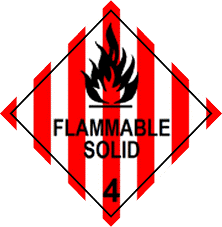



Flammable Solids, Spontaneous Combustibles 'Dangerous When Wet' Materials
When it comes to transporting and handling hazardous materials, flammable solids, spontaneous combustibles, and 'dangerous when wet' materials require specialized expertise and strict compliance with safety regulations. This also applies to materials that have the potential to spontaneously heat up while being transported or exposed to air, which could result in a fire. Additionally, it covers materials that react with water to release flammable gasses or ignite.

We are are proficient in handling flammable solids, dangerous goods. We have the ability to service all customer requests pertaining to the logistics of flammable solids; packing, packaging, compliance, freight forwarding and training.
Reason for RegulationFlammable solids can be dangerous because of their volatility, combustibility, and potential to start or spread large fires.
Sub-DivisionsDivision 1: Flammable solids.
Division 2: Substances liable to spontaneous combustion.
Division 3: Substances that emit flammable gases when they come in contact with water.
Commonly transported Flammable Solids, Spontaneous Combustibles, and "Dangerous When Wet" materialsFlammable Solids: Alkali metals, Metal powders (e.g., aluminum, magnesium), Matches, Naphthalene, Sulfur, Celluloid.
Spontaneous Combustibles: Seed cake, Activated carbon, Oily cotton waste, Iron sponge / direct-reduced iron (spent).
"Dangerous When Wet" Materials: Calcium carbide, Aluminum phosphide, Sodium batteries, Magnesium powder (when in contact with water).